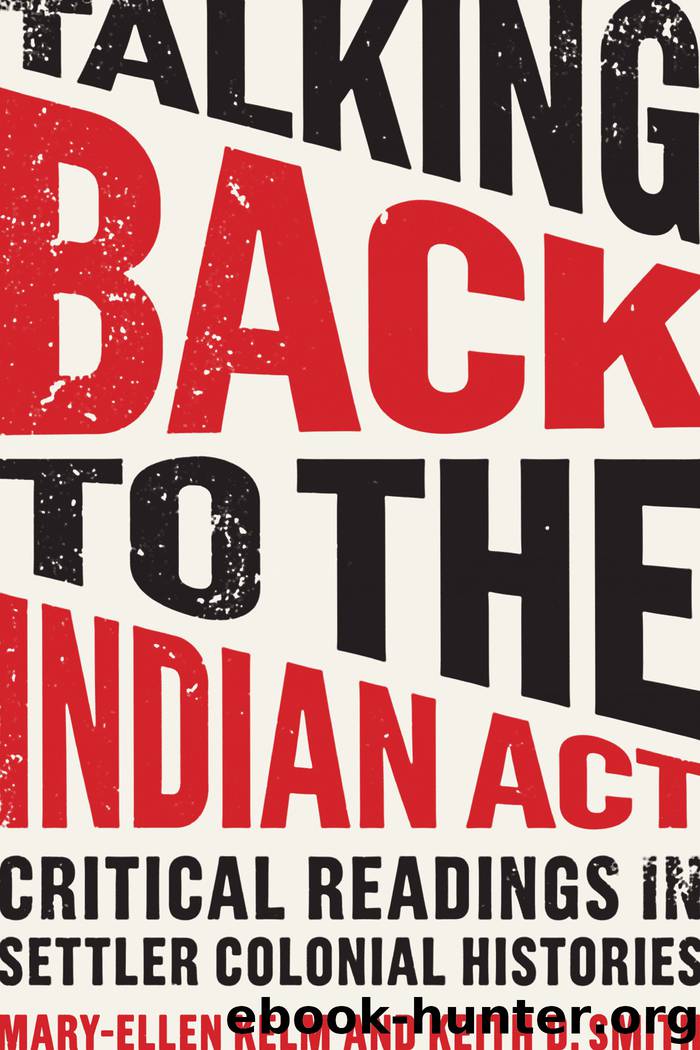Talking Back to the Indian Act by Mary-Ellen Kelm

Author:Mary-Ellen Kelm
Language: eng
Format: epub
Publisher: University of Toronto Press
Published: 2018-09-23T16:00:00+00:00
* * *
GENERAL COUNCIL, SARNIA RESERVE
July 2nd, 1874.
The President, Rev. H. P. Chase, in the chair.
C. Halfmoon offered up prayer.
Moved by Dr. Jones, seconded by Rev. A. Salt, that in the opinion of this General Council some plan or scheme is necessary for the enfranchisement of the educated and temperate Indians.
Carried unanimously.
Chief N. H. Burning—There were, he said, some among his people who were wealthy, educated and civilized. One young man in their community wished to be enfranchised. They granted him the privilege. He received a share of their money. He went over to the States and squandered it all. He came back again to us in utter poverty, and wished to be taken back into our community. He referred to the Sarnia Reserve. He had not seen much progress in agriculture, there were no barns, &c., &c. There was not enough to indicate that the Sarnia Indians were qualified to be enfranchised. Although they, the Six Nations, were greatly in advance in agriculture, still only two per cent of their population were competent to be enfranchised. He advised the young men not to leave their Reserves. There was a great deal of progress to be seen in our midst as we are. He referred to one young man in their midst who was a merchant and was prosperous. It would be foolish in us to cast away the privileges we enjoy in our present condition.
Rev. Allan Salt—To be a British citizen was an important thing, there were many privileges connected with it. He alluded to the British citizens in Africa who were made prisoners. When this came to the knowledge of the English Government, troops were immediately sent for their release.143 And why? because they were British Citizens. St. Paul, as we read in the New Testament, was ordered to be scourged, but when the Government authorities knew that Paul was a Roman citizen he was liberated at once. And why: it was because he was a Roman citizen. St. Paul, as we all know, was a Jew, but he had been made a Roman citizen. In our present state we are minors, we are right therefore in working to become higher than this. St. Paul’s advice is :—That if there is any way of gaining a freedom the advantage should be taken.
Chief Moses Brown—In his tribe there were young men who were educated. He will not keep them back from becoming enfranchised. He wished them all prosperity and happiness. He was proud of their education. He considered the educated were those who were elevating his tribe. The venerable Abram Sickles for instance, had been for many years engaged in teaching his people the way to progress and happiness. In his reserve they had very little money wherewith they might assist those who were being enfranchised, but they had a good portion of land.
The President, Rev. H. P. Chase, spoke as follows :—In order to become a citizen it is necessary to take an oath of allegiance. I have never yet taken this oath, therefore I am not yet a real citizen.
Download
This site does not store any files on its server. We only index and link to content provided by other sites. Please contact the content providers to delete copyright contents if any and email us, we'll remove relevant links or contents immediately.
| Archaeology | Essays |
| Historical Geography | Historical Maps |
| Historiography | Reference |
| Study & Teaching |
Underground: A Human History of the Worlds Beneath Our Feet by Will Hunt(12098)
Sapiens by Yuval Noah Harari(5370)
Navigation and Map Reading by K Andrew(5156)
The Sympathizer by Viet Thanh Nguyen(4390)
Barron's AP Biology by Goldberg M.S. Deborah T(4150)
5 Steps to a 5 AP U.S. History, 2010-2011 Edition (5 Steps to a 5 on the Advanced Placement Examinations Series) by Armstrong Stephen(3733)
Three Women by Lisa Taddeo(3433)
Water by Ian Miller(3185)
The Comedians: Drunks, Thieves, Scoundrels, and the History of American Comedy by Nesteroff Kliph(3079)
Drugs Unlimited by Mike Power(2594)
A Short History of Drunkenness by Forsyth Mark(2297)
DarkMarket by Misha Glenny(2212)
And the Band Played On by Randy Shilts(2209)
The House of Government by Slezkine Yuri(2206)
The Library Book by Susan Orlean(2069)
Revived (Cat Patrick) by Cat Patrick(1991)
The Woman Who Smashed Codes by Jason Fagone(1973)
The Absolutely True Diary of a Part-Time Indian by Sherman Alexie(1913)
Birth by Tina Cassidy(1904)
